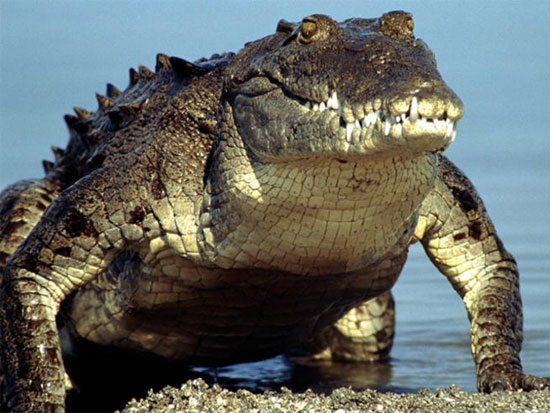Interesting things about crocodiles
Owning yourself like the reptiles that used to live in prehistoric times, crocodiles carry within themselves the potential of ancient times, helping them become kings on swamps and rivers throughout the tropics.
Crocodiles live strongly on wetlands, tropical rivers in Africa, Asia, America and Oceania. There are 14 different crocodile species of all sizes and characteristics that exist on the earth, from small dwarf crocodiles to large saltwater crocodiles.
Quite famous for its size, American crocodiles can be 4.6m long and weigh 900kg. This crocodile is found in southern Mexico, Central America, the Caribbean and northern South America. A large number of these animals were discovered in Florida wetlands, USA.

Crocodile species carry in themselves the power from the time
ancient. (Photo: Gianfranco Lanzetti / nationalgeographic)
The food of alligators is generally those living on the ground and underwater. They can eat fish, birds, mammals or even smaller crocodiles if given the opportunity. For terrestrial animals, crocodiles will find an opportunity to attack when they come to drink water near the edge of the river.
The majority of the crocodile's attack is aimed at the dead end of the prey. Because the structure of the jaw does not allow the crocodile to perform chewing, they often tear the prey to pieces and swallow it. With an "iron" stomach, alligators swallow even more ice to help crush the swallowed food.
Crocodiles cannot tear their prey in the normal way, so they use a great way to shred meat before swallowing. The strong jaw tightens on the prey before the limbs and the tail support the crocodile to rotate and tear the flesh. The power behind the swings makes all the prey torn.
Because of the underwater life, the crocodile's limbs and tails perfectly support the swimming ability. The extremely strong tail helps crocodiles to swim at 32km / h while the strength of the limbs is expressed even when the crocodile is on the ground. Leaving the water environment, alligators can move at a maximum speed of 18km / h in short distances.
As a reptile, alligators breed by laying eggs. Therefore, crocodile eggs should be buried in dry soil to ensure temperature for growth. Therefore, alligators are forced to leave the water surface to shore and burrow eggs. In particular, these caves are not located near the water's edge to ensure the safety of alligators.
In addition, alligators also possess extremely sensitive hearing and smell. The nose lies in front of the jaw and juts out from the water surface to allow the crocodile to sniff for prey, while the perfect sense of smell helps this animal to hear well underwater. Even the sound of the crocodile's petition is also heard clearly so that alligators can go ashore to help their children enter life.
In fact, crocodile metabolism occurs very slowly, making them exist for months without food. This helps crocodiles survive when the weather in the tropics becomes dry in the summer months. Although possessing superior viability, it is the hegemony of humans into the natural environment of crocodiles that makes this animal gradually isolated.
- 10 interesting things about life you may not know
- 10 interesting things about nature you may not know
- Interesting things about animals
- Going from one surprise to the other is different from the interesting things about all things
- Super interesting things about math you will definitely fall back
- 12 horrible things about China you may not know
- Animal World - Interesting things you don't know
- 10 interesting things about cats
- 10 interesting things about the Internet that you don't know
- Reckless close to giant crocodiles for 15 years
- Ancient crocodiles are vegetarian animals
- Through 6 million years of evolution,
 Animal 'suffering' after hibernation
Animal 'suffering' after hibernation Why do goats climb well?
Why do goats climb well? Scientists were surprised to see chimpanzees eating turtles
Scientists were surprised to see chimpanzees eating turtles Giant catfish died deadly due to drought in Thailand
Giant catfish died deadly due to drought in Thailand